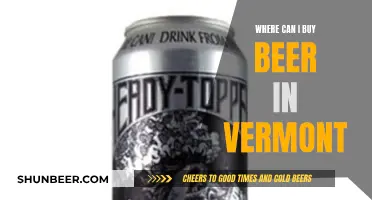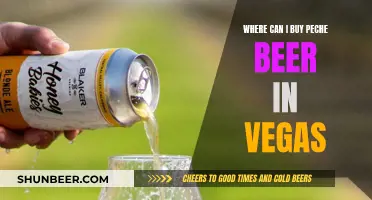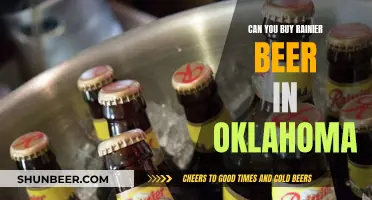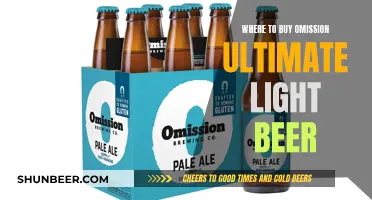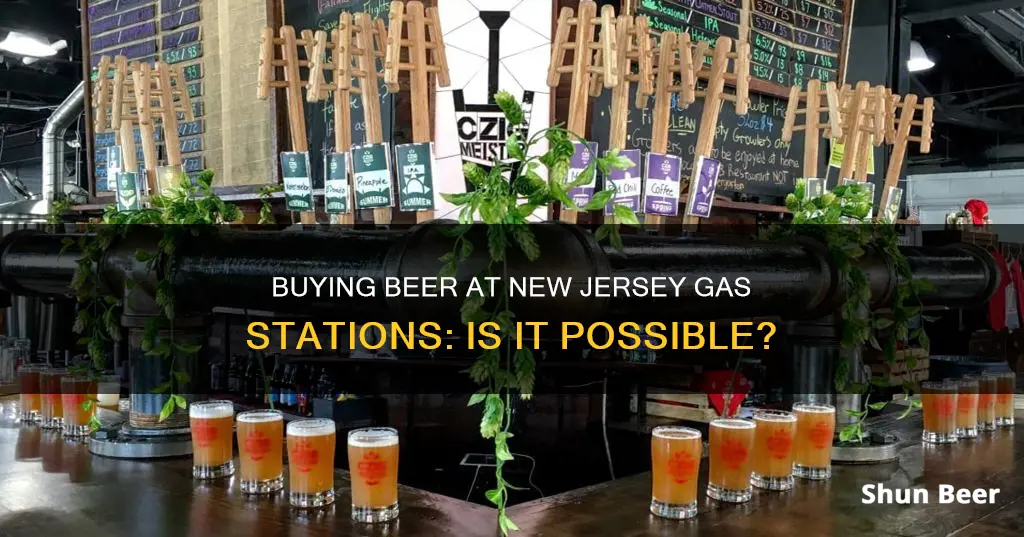
New Jersey has some of the most complex alcohol laws in the United States, with many peculiarities not found in other states. While the state is not dry, some of its counties and towns are. Local ordinances have permission to vote on alcohol sales and to enforce stricter laws regarding them. Although there is no ban on selling alcoholic beverages at grocery stores, New Jersey limits each chain to two licenses, so most supermarkets, convenience stores, gas stations, and pharmacies do not sell alcoholic beverages. Gas stations in New Jersey can technically sell beer, but only two locations per chain can have a license at once.
| Characteristics | Values |
|---|---|
| Can you buy beer at gas stations in New Jersey? | Yes, but only two locations per chain can have a license at once. |
| How many licenses can a grocery store chain have? | Two |
| Can you buy beer on a Sunday in New Jersey? | Yes, from 9 a.m. to 10 p.m. if there are no municipal laws against Sunday sales during those times. |
| Can you buy beer at a bar in New Jersey? | Yes, from 9 a.m. to 2 a.m. any day, but some municipalities can enforce stricter hours of operation. |
| Can you buy beer at a restaurant in New Jersey? | Yes, from 9 a.m. to 2 a.m. any day, but some municipalities can enforce stricter hours of operation. |
| Can you buy beer at a package or liquor store in New Jersey? | Yes, from 9 a.m. to 10 p.m. |
| Can you buy beer at a brewery or taproom in New Jersey? | Yes, from 9 a.m. to 2 a.m. but the hours of operation are dependent on the town it resides. |
| Can you get beer delivered in New Jersey? | Yes |
| Minimum drinking age in New Jersey | 21 |
What You'll Learn
- New Jersey's alcohol laws are complex and vary from town to town
- Only two locations per chain can have a license to sell beer
- There are 30 dry municipalities in New Jersey where the retail sale of alcohol is illegal
- Bars in New Jersey are allowed to be open until 2 a.m
- The minimum drinking age in New Jersey is 21

New Jersey's alcohol laws are complex and vary from town to town
The state allows bars to be open until 2 a.m., but some counties may choose to enforce earlier closing times. While there are no dry counties in New Jersey, there are 30 dry municipalities where the retail sale of alcohol is illegal. These dry towns cannot forbid the consumption, transportation, or possession of alcohol. Some dry towns permit alcohol sales if it's produced on-site.
The number of retail licenses available is determined by a municipality's population and may be further limited by the town's governing body. As a result, the availability of alcohol and regulations governing it vary significantly from town to town. A small percentage of municipalities in the state are "dry towns" that do not allow alcoholic drinks to be sold and do not issue retail licenses for bars or restaurants to serve alcohol to patrons. Other towns permit alcohol sales 24 hours a day.
Retail licenses are difficult to obtain and are subject to exorbitant prices and fervent competition. Corporations are limited to two retail distribution licenses, making it impractical for chain stores to sell alcoholic drinks. This restriction, in conjunction with municipal ordinances, severely limits supermarket and convenience store chains from selling beer, as they do in many other states.
New Jersey's alcohol laws are enforced by the Division of Alcoholic Beverage Control, overseen by the state's Attorney General. The state has a strong tradition of municipal home rule, and local municipalities have considerable authority in the licensing and regulating of alcohol-related businesses. These powers include limiting the number of licenses to sell alcoholic beverages, prohibiting the retail sale of alcoholic beverages on Sundays, regulating the conduct of retail establishments licensed to sell alcoholic beverages, and allowing municipalities with populations of 15,000 or more to appoint a municipal alcoholic beverage control board.
The sale of alcoholic beverages in New Jersey is restricted in terms of where and when they can be purchased. For example, the sale of liquor is prohibited from 9 a.m. to 10 p.m., while beer and wine can be sold at any time on-premise sales are permitted in that municipality. Most liquor stores close at 10 p.m., but some remain open an hour later, selling only beer and wine. Cities like Jersey City and Newark are exempt from this law and may set their own hours for liquor sales.
In addition, each supermarket company is only allowed one or two stores that sell alcoholic beverages. Gas stations can technically sell beer, but only two locations per chain can have a license at once. Grocery stores operate similarly, with only two licenses permitted per chain.
New Jersey's alcohol laws also include some unique features, such as allowing bar owners or employees to give away a free drink as long as it is not advertised. The state also has strict open container laws, prohibiting open containers of alcohol in the passenger portion of a private automobile.
Overall, New Jersey's alcohol laws are complex and vary across different towns and municipalities, with a mix of state-level and local regulations governing the sale and consumption of alcoholic beverages.
Yuengling Flight: Where to Buy the Popular Beer
You may want to see also

Only two locations per chain can have a license to sell beer
New Jersey's laws governing alcoholic beverages are among the most complex in the United States. The state law prohibits any person or corporation from possessing more than two retail distribution licenses. This makes it impractical for chain stores to sell alcoholic drinks, including beer.
The law severely limits supermarket and convenience store chains from selling beer, as they do in many other states. This is because the law restricts corporations to two retail distribution licenses.
The number of retail licenses available is determined by a municipality's population and may be further limited by the town's governing body. As a result, the availability of alcohol and regulations governing it vary significantly from town to town.
A small percentage of municipalities in the state are "dry towns" that do not allow alcoholic drinks to be sold and do not issue retail licenses for bars or restaurants to serve alcohol to patrons. Other towns permit alcohol sales 24 hours a day.
Retail licenses tend to be difficult to obtain and are subject to exorbitant prices and fervent competition.
Expired License Beer Purchase: What's the Legal Ruling?
You may want to see also

There are 30 dry municipalities in New Jersey where the retail sale of alcohol is illegal
New Jersey has some of the most complex state laws governing alcoholic beverages in the United States, with 29 distinct liquor licenses and many peculiarities not found in other states' laws. While the state is not dry, there are 30 dry municipalities in New Jersey where the retail sale of alcohol is illegal. These dry towns are mostly in South Jersey and are largely a result of their strong affiliations with religious groups like Quakers and Puritans, as well as a concern for the potential damage that alcohol can inflict on their communities.
Dry towns in New Jersey are only permitted to prohibit the sale of liquor and cannot forbid the possession, consumption, or transportation of alcoholic beverages. It is possible to find restaurants that offer BYOB (bring your own bottle/beer) in these dry communities, and breweries or wineries can exist within them since alcohol manufacturing licenses are granted by the state and not the municipality.
The state laws grant individual municipalities substantial discretion in passing ordinances that regulate the sale and consumption of alcoholic drinks within their limits. The number of retail licenses available is determined by a municipality's population and may be further limited by the town's governing body. Retail licenses tend to be difficult to obtain and are subject to exorbitant prices and fervent competition.
New Jersey's history with alcohol dates back to its early colonial period. During the 19th and early 20th centuries, the industry developed with the influx of European immigrants, particularly Germans and Italians, who presented a sizable market for alcoholic drinks and brought with them old-world winemaking, brewing, and distilling techniques. With the rise of the temperance movement, which culminated in Prohibition (1919-1933), New Jersey's alcohol industry suffered. Many breweries, wineries, and distilleries either closed or relocated to other states.
The state's alcohol industry and regulations continue to lag behind other modern states despite recently enacted laws to loosen restrictions. The complex laws governing alcoholic beverages in New Jersey make it challenging for gas stations to sell alcohol. While some gas stations attached to convenience stores or grocery stores with liquor licenses may sell beer, it is very rare to find one.
Buying Beer at Michigan Stadium: What's the Deal?
You may want to see also

Bars in New Jersey are allowed to be open until 2 a.m
New Jersey has some of the most complex alcohol laws in the United States, with many peculiarities not found in other states. While there is no state law requiring bars to close at a particular time, most bars in the state shut at 2 a.m. In Atlantic City, however, bars can operate for 24 hours.
The state laws governing alcoholic beverages in New Jersey are under the purview of the Division of Alcoholic Beverage Control, overseen by the state's Attorney General. While the state government has the general authority for statutory and regulatory control of alcoholic drinks, individual municipalities have substantial discretion in passing ordinances regulating the sale and consumption of alcohol within their limits.
The availability of alcohol and the regulations governing it can vary significantly from town to town. A small percentage of municipalities in the state are "dry towns" that do not allow alcoholic drinks to be sold and do not issue retail licenses for bars or restaurants to serve alcohol to patrons. In contrast, other towns permit alcohol sales 24 hours a day.
Retail licenses are generally difficult to obtain and are subject to exorbitant prices and fierce competition. State law prohibits any person or corporation from possessing more than two retail distribution licenses, making it impractical for chain stores, supermarkets, and convenience stores to sell alcoholic drinks. This restriction, in conjunction with municipal ordinances, severely limits the sale of beer in supermarkets and convenience stores, unlike in many other states.
The history of alcohol regulation in New Jersey dates back to its early colonial period. The state's alcohol industry suffered during the temperance movement, culminating in Prohibition (1919-1933), with many breweries, wineries, and distilleries closing or relocating. While the state legislature began loosening restrictions and repealing Prohibition-era laws in 1981, New Jersey's alcohol industry and regulations still lag behind other modern states.
The closing time of bars and the sale of alcohol can vary across different states in the US, and failure to adhere to these strict drinking times is considered an offense. While some states have a closing time of 2 a.m. for bars, others may have different times or allow 24-hour operations.
Where to Buy Deschutes Mirror Pond Beer in Wyoming
You may want to see also

The minimum drinking age in New Jersey is 21
New Jersey's alcohol laws are complex and differ from other states. The state has a strong tradition of municipal home rule, giving local municipalities considerable authority over the licensing and regulation of alcohol-related businesses. This includes limiting the number of licenses to sell alcohol, restricting the hours of alcohol sales, and prohibiting the retail sale of alcohol on Sundays.
One notable aspect of New Jersey's alcohol laws is the restriction on the number of retail distribution licenses. State law prohibits any person or corporation from possessing more than two retail distribution licenses, which makes it impractical for chain stores, supermarkets, and convenience stores to sell alcoholic beverages. This is why you won't find alcohol in most gas stations, grocery stores, or pharmacies in New Jersey.
The high cost of liquor licenses and the limited number of licenses available also contribute to the strict alcohol regulations in the state. The sale of a new license is often done through public auction, resulting in high prices that can reach up to $1.5 million.
While New Jersey is not a dry state, it does have dry municipalities where the retail sale of alcohol is prohibited. These dry towns, found mostly in the southern part of the state, cannot forbid the consumption, transportation, or possession of alcohol. Some dry towns permit alcohol sales if it is produced on-site.
Although the state allows bars to remain open until 2 a.m., counties and municipalities can enforce earlier closing times. Atlantic City is an exception, with no closing times for alcohol sales in casinos and bars.
The minimum drinking age in New Jersey is set in accordance with the National Minimum Drinking Age Act of 1984, which established 21 as the minimum age for purchasing and consuming alcoholic beverages nationwide. This law was enacted to address concerns about drunk driving and underage drinking, with Congress tying federal highway funding to states' compliance with the minimum drinking age requirement.
In New Jersey, exceptions to the underage drinking laws include religious services, employment in licensed establishments, and consumption in private locations with adult relatives. However, it is illegal to serve alcohol to anyone under 21, and establishments face penalties for doing so.
Snake Venom Beer: Where to Buy This Exotic Brew?
You may want to see also
Frequently asked questions
Yes, but only two locations per chain can have a license at once.
Beer can be bought from 9 a.m. to 2 a.m. any day of the week. In Atlantic City, there are no closing times.
Yes, there are 30 dry municipalities in New Jersey where the retail sale of alcohol is illegal.
Yes, but each supermarket company is only allowed to have one or two stores that sell it.



